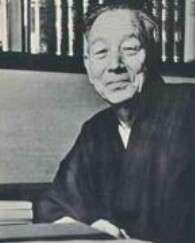Tetsuro Watsuji
| Tetsuro Watsuji | |
|---|---|
 | |
| Born |
March 1, 1889 Himeji, Hyōgo Prefecture |
| Died | December 26, 1960 |
| Era | 20th-century philosophy |
| Region | Japanese philosophy |
| School | Kyoto School |
Main interests | Aesthetics, Ethics, Culture, Religion |
Notable ideas | Climate and Culture, Rinrigaku Ethics |
|
Influences
| |
|
Influenced
| |
Tetsuro Watsuji (Japanese: 和辻 哲郎 Hepburn: Watsuji Tetsurō) (March 1, 1889 – December 26, 1960) was a Japanese moral philosopher, cultural historian, and intellectual historian.
Early life
Watsuji was born in Himeji, Hyōgo Prefecture to a physician. During his youth he enjoyed poetry and had a passion for Western literature. For a short time he was the coeditor of a literary magazine and was involved in writing poems and plays. His interests in philosophy came to light while he was a student at First Higher School in Tokyo, although his interest in literature would always remain strong throughout his life.
In his early writings (between 1913 and 1915) he introduced the work of Søren Kierkegaard to Japan, as well as working on Friedrich Nietzsche, but in 1918 he turned against this earlier position, criticizing Western philosophical individualism, and attacking its influence on Japanese thought and life. This led to a study of the roots of Japanese culture, including Japanese Buddhist art, and notably the work of the medieval Zen Buddhist Dogen. Watsuji was also interested in the famous Japanese writer Natsume Sōseki, whose books were influential during Watsuji's early years.
Career
In the early 1920s Watsuji taught at Toyo, Hosei and Keio universities, and at Tsuda Eigaku-juku.[1]
The issues of hermeneutics attracted his attention.[2]
In 1925 Watsuji became professor of ethics at Kyoto University, joining the other leading philosophers of the time, Nishida Kitaro and Tanabe Hajime. He then moved to the Tokyo Imperial University in 1934 and held the chair in ethics until 1949.
During World War II his theories (which claimed the superiority of Japanese approaches to and understanding of human nature and ethics, and argued for the negation of self) provided support for Japanese nationalism, a fact which, after the war, he said that he regretted.
Watsuji died at the age of seventy-one.
Work
Watsuji's three main works were his two-volume 1954 History of Japanese Ethical Thought, his three-volume Rinrigaku (Ethics), first published in 1937, 1942, and 1949, and his 1935 Fūdo. The last of these develops his most distinctive thought. In it, Watsuji argues for an essential relationship between climate and other environmental factors and the nature of human cultures, and he distinguished three types of culture: pastoral, desert, and monsoon.[3]
Writings
- 1961–1963: Watsuji Tetsurō Zenshū (Complete Works of Tetsuro Watsuji) 20 volumes (Tokyo: Iwanami Shoten)
English translations
- 1961: Climate and Culture: A Philosophical Study trans. from Fūdo (風土) by Geoffrey Bownas (Westport, CT: Greenwood Press)
- 1969: Japanese Ethical Thought in the Noh Plays of the Muromachi Period trans. from chapter 4 of Nihon Rinri Shisōshi (日本倫理思想史) by David A. Dilworth (Monumenta Nipponica 24:4, 467-498)
- 1971: The Significance of Ethics As the Study of Man trans. from the introduction to Rinrigaku (倫理学) vol. 1 by David A. Dilworth (Monumenta Nipponica 26:3/4, 395-413)
- 1996: Watsuji Tetsurō's Rinrigaku: Ethics in Japan trans. from the first half of Rinrigaku (倫理学) vol. 1 by Seisaku Yamamoto & Robert Carter (Albany: State University of New York Press)
- 1998: Various essays in Sourcebook for Modern Japanese Philosophy by David Dilworth and Valdo Viglielmo with Agustin Jacinto Zavala.
- 2009: Mask and Persona trans. from Men to Perusona (面とペルソナ) by Carl M. Johnson
- 2009: The Psychology of Idol Worship trans. from Gūzō Sūhai no Shinri (偶像崇拝の心理) by Carl M. Johnson
- 2011: Purifying Zen: Watsuji Tetsurō's Shamon Dōgen trans. from Shamon Dōgen (沙門道元) by Steve Bein (Honolulu: University of Hawaii Press)
- 2011: Pilgrimages to the Ancient Temples in Nara trans. from Koji Junrei (古寺巡礼) by Hiroshi Nara (Portland, ME: MerwinAsia) (2012)
See also
Notes
- ↑ David A. Dilworth, et al., Sourcebook for Modern Japanese Philosophy: Selected Documents (Westport, Conn.: Greenwood Press); cited in Robert Carter, "Watsuji Tetsurô", Stanford Encyclopedia of Philosophy, 2004.
- ↑ Marra, Michael F. (2002). Japanese hermeneutics, pp. 76-88., p. 76, at Google Books
- ↑ The French philosopher Montesquieu had developed a theory along similar lines, though with very different conclusions.
References
- Maraldo, John C. (2001). "Watsuji" in A Companion to the Philosophers (Robert L. Arrington, editor). Oxford: Blackwell. ISBN 0-631-22967-1
- Marra, Michael F. (2002). Japanese hermeneutics: Current Debates on Aesthetics and Interpretation. Honolulu: University of Hawai'i Press. ISBN 9780824824570; OCLC 237578040
- Mayeda, Graham. (2006). Time, space and ethics in the philosophy of Watsuji Tetsurō, Kuki Shūzō, and Martin Heidegger (New York: Routledge, 2006). ISBN 0-415-97673-1 (alk. paper).
- Hans Peter Liederbach (2001): Martin Heidegger im Denken Watsuji Tetsuros, München: Iudicium, ISBN 3-89129-363-1
External links
| Wikimedia Commons has media related to Tetsurō Watsuji. |
- Carter, Robert. "Watsuji Tetsurô". Stanford Encyclopedia of Philosophy.